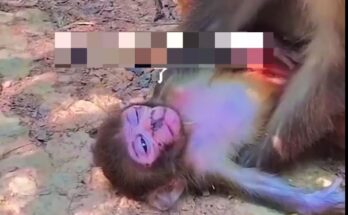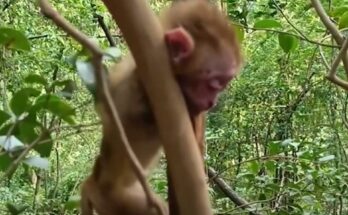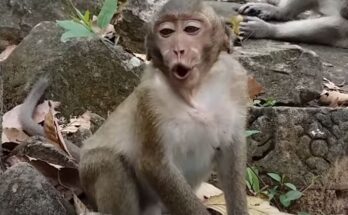In the heart of a dense jungle, a tiny monkey erupted in a furious tantrum, much to the exasperation of its mother. The little primate, no bigger than a squirrel, stomped its tiny feet, flailed its arms, and screeched at the top of its lungs. Its fluffy tail lashed back and forth as it expressed its outrage, throwing leaves and twigs in every direction.
The mother monkey, a patient and seasoned parent, watched with a mixture of amusement and mild irritation. She had seen it all before. Perhaps her offspring was upset over a denied treat—maybe a juicy mango or a stolen banana from another troop. Or perhaps the young monkey simply didn’t want to follow the group through the canopy, preferring instead to explore on its own.
As the tantrum escalated, the tiny monkey dramatically flopped onto its back, kicking up dirt and howling into the treetops. Birds fluttered away, startled by the commotion. A few other monkeys in the troop paused to watch, chattering among themselves.
The mother remained unshaken. With a practiced sigh, she reached down, scooped up her tantrum-throwing child, and carried it under one arm like a sack of fruit. The little monkey continued to squirm and protest, but its cries slowly died down as it realized its outburst was having no effect.
Before long, the jungle returned to its usual harmony—the rustling leaves, distant calls of exotic birds, and the occasional chatter of primates swinging through the trees. The tiny monkey, now calmer, clung to its mother’s fur, having learned that no amount of furious foot-stomping would change the way of the jungle. For now, at least, the tantrum was over—but who knew what drama awaited tomorrow?


